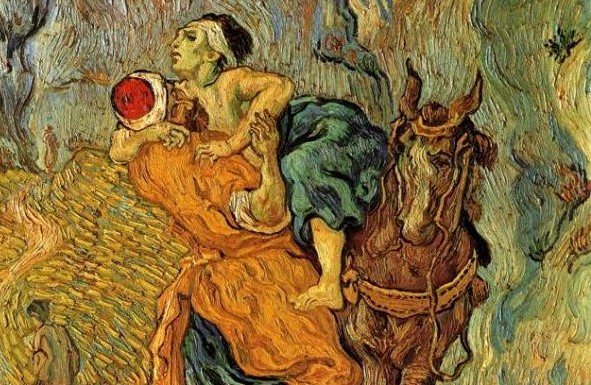July 14, 2019
Luke 10:25-37
You might think that you know the meaning of the parable of the Good Samaritan. But maybe not. Almost everyone would say that the point of this parable is to help whoever we meet who is in need. The parable certainly means that. But there is another, deeper meaning that is also possible. This meaning emerges when we appreciate the shock that must have occurred when Jesus first told this parable to his Jewish audience. Jesus makes the hero of this parable someone that Jews hated. He makes the hero of this parable a Samaritan.
Jews and Samaritans were enemies for centuries. If you consider the modern-day antipathy between Jews and Palestinians, you will have some sense of what the relationship between Jews and Samaritans were at the time of Jesus. But in this parable, Jesus makes a Samaritan the person who helps the man in the ditch. By doing this, he presents the Samaritan as God’s agent, as the one God uses to save the Jewish person who was beaten by the robbers. The text is very explicit on this. There are other characters in the story who would be much more likely candidates to help the man who was in trouble. The priest and the Levite were respected religious members of the community. Everyone would suppose that they would stop and help, but they do not. The Samaritan does.
If Jesus was telling this story to us today, it might sound something like this. A man fell victim to robbers as he was going down from Jerusalem to Jericho. They stripped him and beat him, and went off leaving him half dead. Now, Pope Francis happened to be going down that road, and when he saw him, he passed by on the opposite side. Likewise, Mother Theresa came to that place, and when she saw him, she passed by on the opposite side. But then, Osama Bin Laden came upon him, and when he saw him, he was moved with compassion. He approached him, and poured oil and wine on his wounds, and bandaged them. Then he lifted him on his own animal, and took him to the inn, and cared for him. The next day he took out two silver pieces, and instructed the inn keeper, “Take care of him, and if you spend anything more than what I have given to you, I will repay you on my way back”. The shock of Jesus’ parable is that he makes the least likely character – the most hated character – the one who helps the man in the ditch.
What this parable then is telling us is that any person in our life, no matter how unlikely, could, on any specific day, be the person that God sends to help us. Every situation, no matter how hopeless, is still a situation in which God might choose to save us.
There might be a member of your family you can’t stand, and every time you encounter this person, there is a problem. There might be someone at school or at work whom you have written off as a loser. This parable tells us that God is capable of sending that person to you in your time of need. There might be someone in the public sphere with whom you disagree violently, a politician or a government official for whom you have no respect. This parable says that God is free to use even that person to bring about a good thing, for you or for our country. You might find yourself in a hopeless situation, a situation where you are overcome with the grief of someone you love or a facing a fatal diagnosis of cancer. This parable says that even in that darkness, God is still able to find a way to bless you.
Now of course, the people who usually help us are the people we love and respect. The situations in which we usually recognize God’s blessings are situations of success and joy. But the parable of the Good Samaritan tells us that God will not be limited by any person or any situation. God will bring salvation how and when God chooses. So be warned. Be ready. It might be in a time of loss or pain that you discover for the first time what is really important in life. It might be your enemy that God sends down the road to save you.

